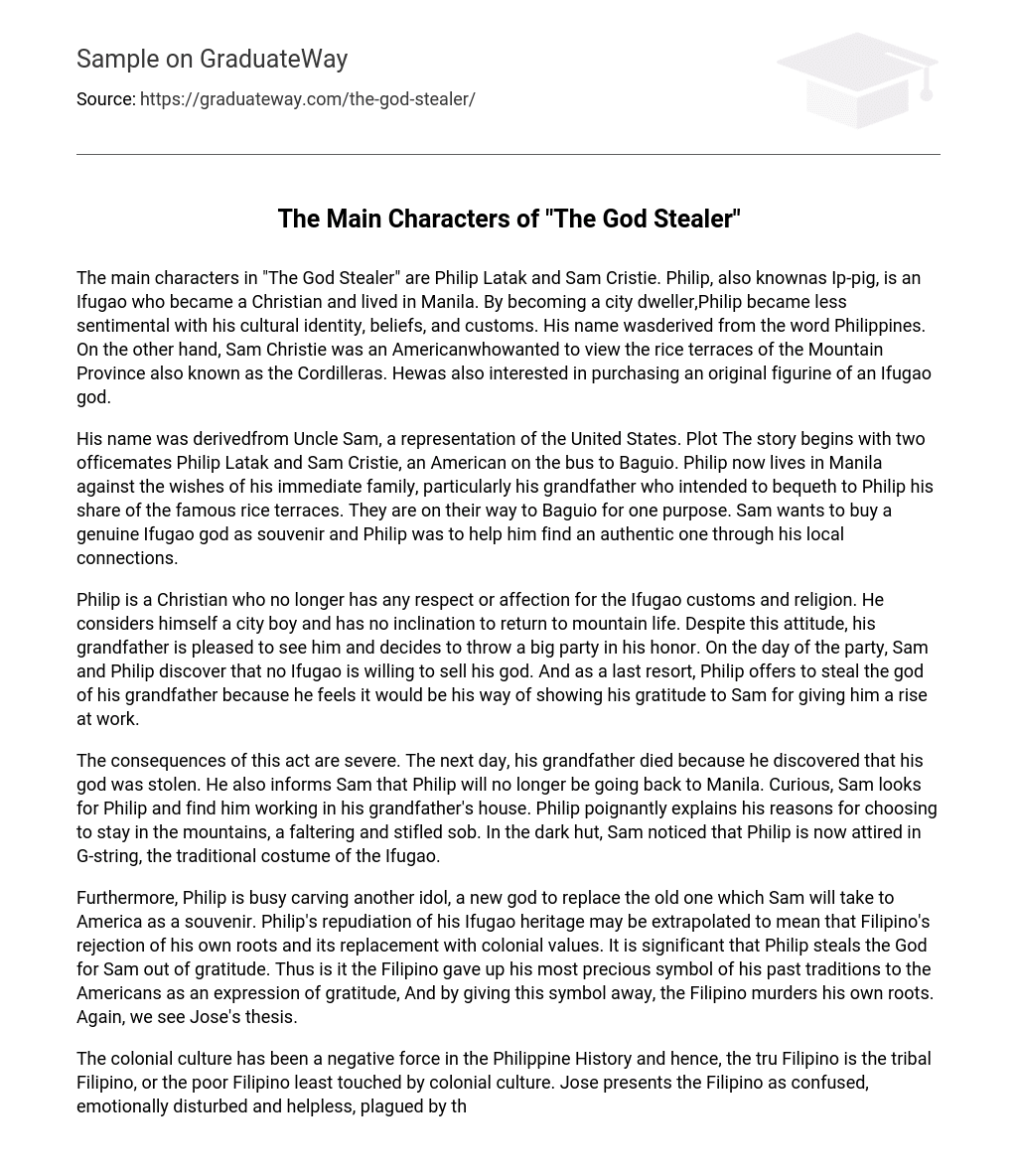The main characters in “The God Stealer” are Philip Latak and Sam Cristie. Philip, also knownas Ip-pig, is an Ifugao who became a Christian and lived in Manila. By becoming a city dweller,Philip became less sentimental with his cultural identity, beliefs, and customs. His name wasderived from the word Philippines. On the other hand, Sam Christie was an Americanwhowanted to view the rice terraces of the Mountain Province also known as the Cordilleras. Hewas also interested in purchasing an original figurine of an Ifugao god.
His name was derivedfrom Uncle Sam, a representation of the United States. Plot The story begins with two officemates Philip Latak and Sam Cristie, an American on the bus to Baguio. Philip now lives in Manila against the wishes of his immediate family, particularly his grandfather who intended to bequeth to Philip his share of the famous rice terraces. They are on their way to Baguio for one purpose. Sam wants to buy a genuine Ifugao god as souvenir and Philip was to help him find an authentic one through his local connections.
Philip is a Christian who no longer has any respect or affection for the Ifugao customs and religion. He considers himself a city boy and has no inclination to return to mountain life. Despite this attitude, his grandfather is pleased to see him and decides to throw a big party in his honor. On the day of the party, Sam and Philip discover that no Ifugao is willing to sell his god. And as a last resort, Philip offers to steal the god of his grandfather because he feels it would be his way of showing his gratitude to Sam for giving him a rise at work.
The consequences of this act are severe. The next day, his grandfather died because he discovered that his god was stolen. He also informs Sam that Philip will no longer be going back to Manila. Curious, Sam looks for Philip and find him working in his grandfather’s house. Philip poignantly explains his reasons for choosing to stay in the mountains, a faltering and stifled sob. In the dark hut, Sam noticed that Philip is now attired in G-string, the traditional costume of the Ifugao.
Furthermore, Philip is busy carving another idol, a new god to replace the old one which Sam will take to America as a souvenir. Philip’s repudiation of his Ifugao heritage may be extrapolated to mean that Filipino’s rejection of his own roots and its replacement with colonial values. It is significant that Philip steals the God for Sam out of gratitude. Thus is it the Filipino gave up his most precious symbol of his past traditions to the Americans as an expression of gratitude, And by giving this symbol away, the Filipino murders his own roots. Again, we see Jose’s thesis.
The colonial culture has been a negative force in the Philippine History and hence, the tru Filipino is the tribal Filipino, or the poor Filipino least touched by colonial culture. Jose presents the Filipino as confused, emotionally disturbed and helpless, plagued by the fact that he repudiated his past, or that he could not do anything to help the suffering. Conflict Theme Symbols Philip’s act of thievery represented the Filipinos’ giving up of their past tribal origins andtraditions, only to be replaced by an “unnatural” culture brought by colonialism.
At one time inhistory, colonialism brought to the Filipinos a state of confusion, troubled emotions,helplessness, torment, embarrassment and the inability to embrace the past. Insights This story is not only about the Filipino culture and tradition but also the good characters of the Filipino people, the life they have suffered, the difference between the Ifugao belief and the stranger, about the love of Filipinos in their native land, the contentment of Ifugao of what they have; all in all, it’s all about the Filipinos.





